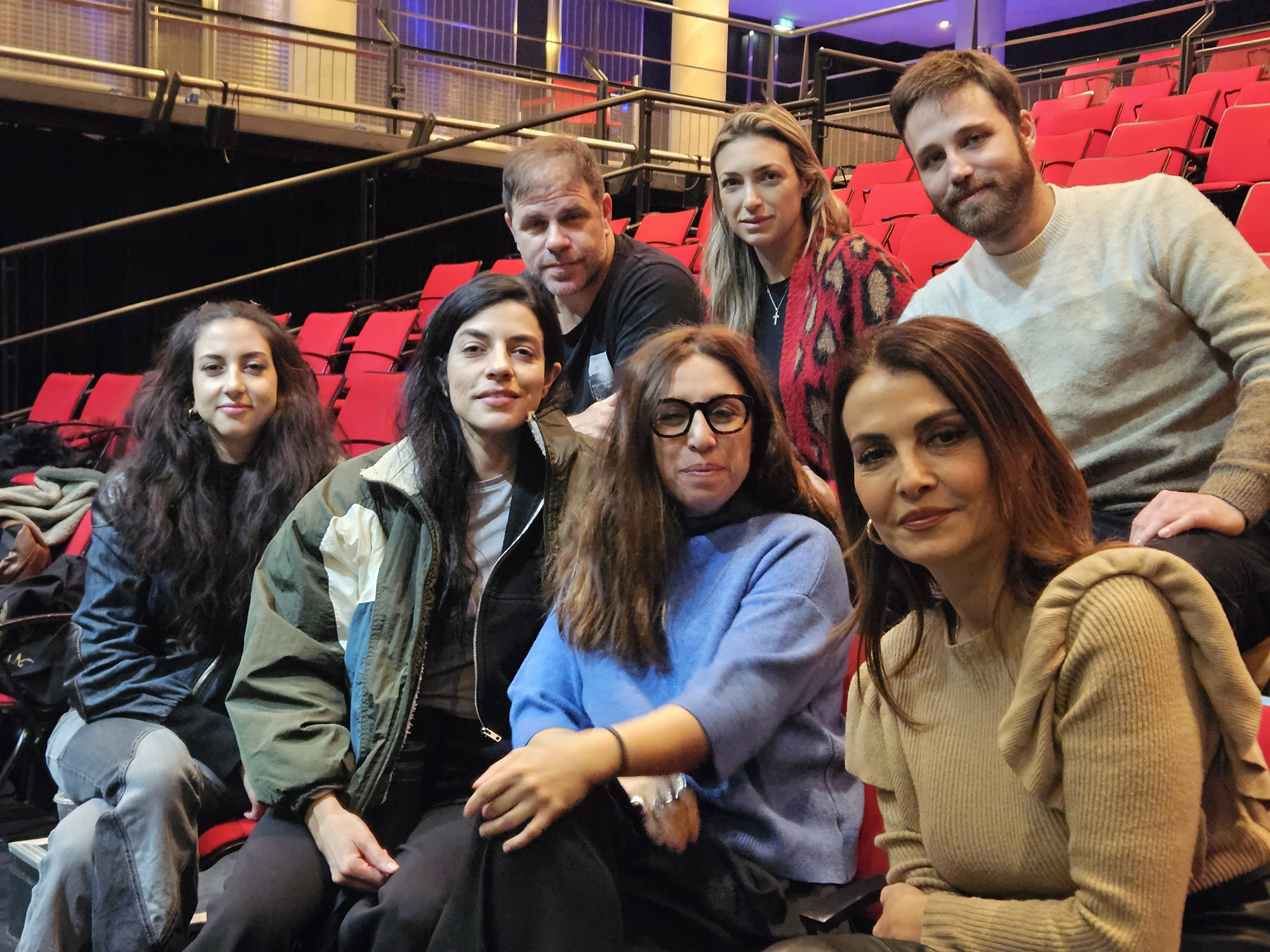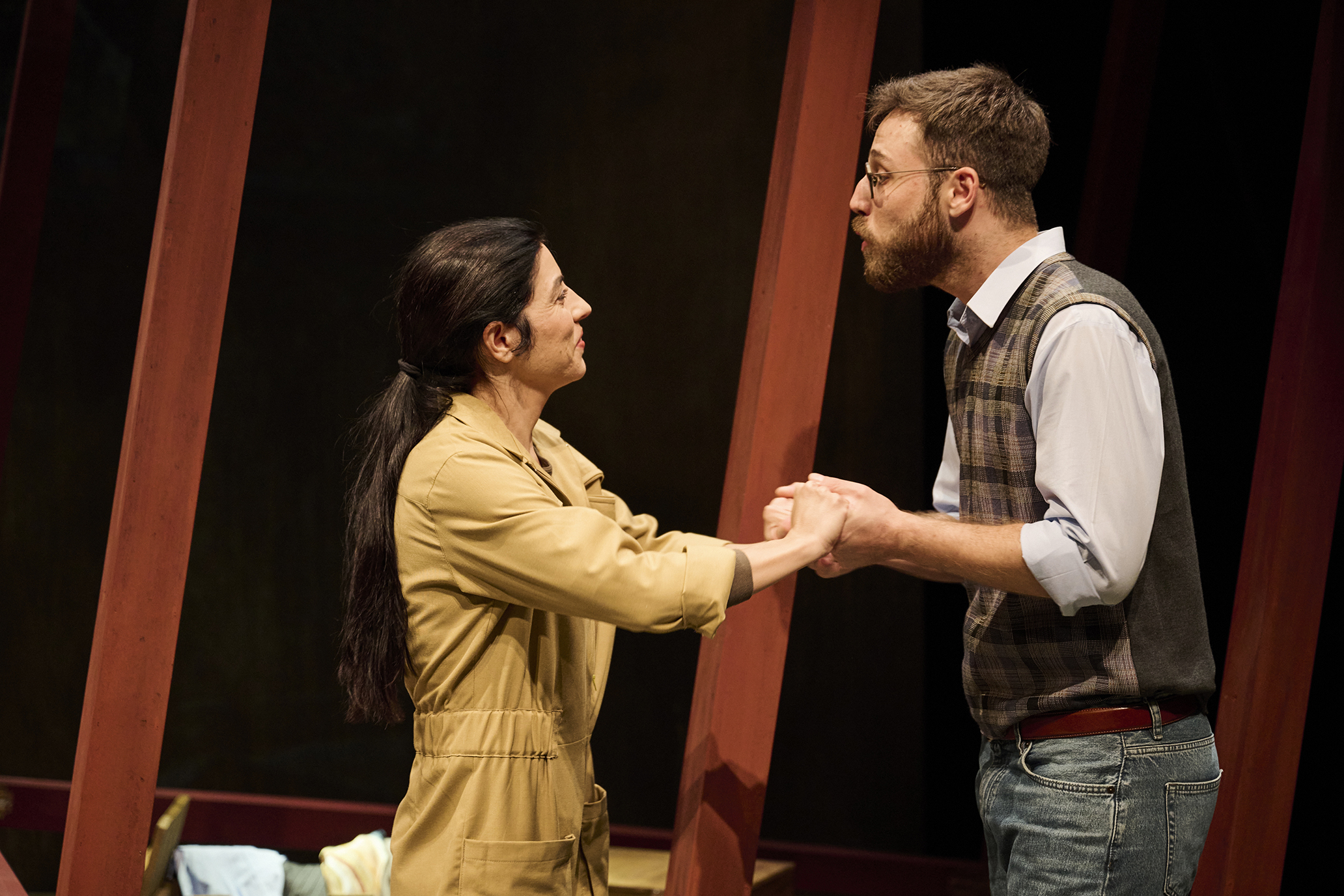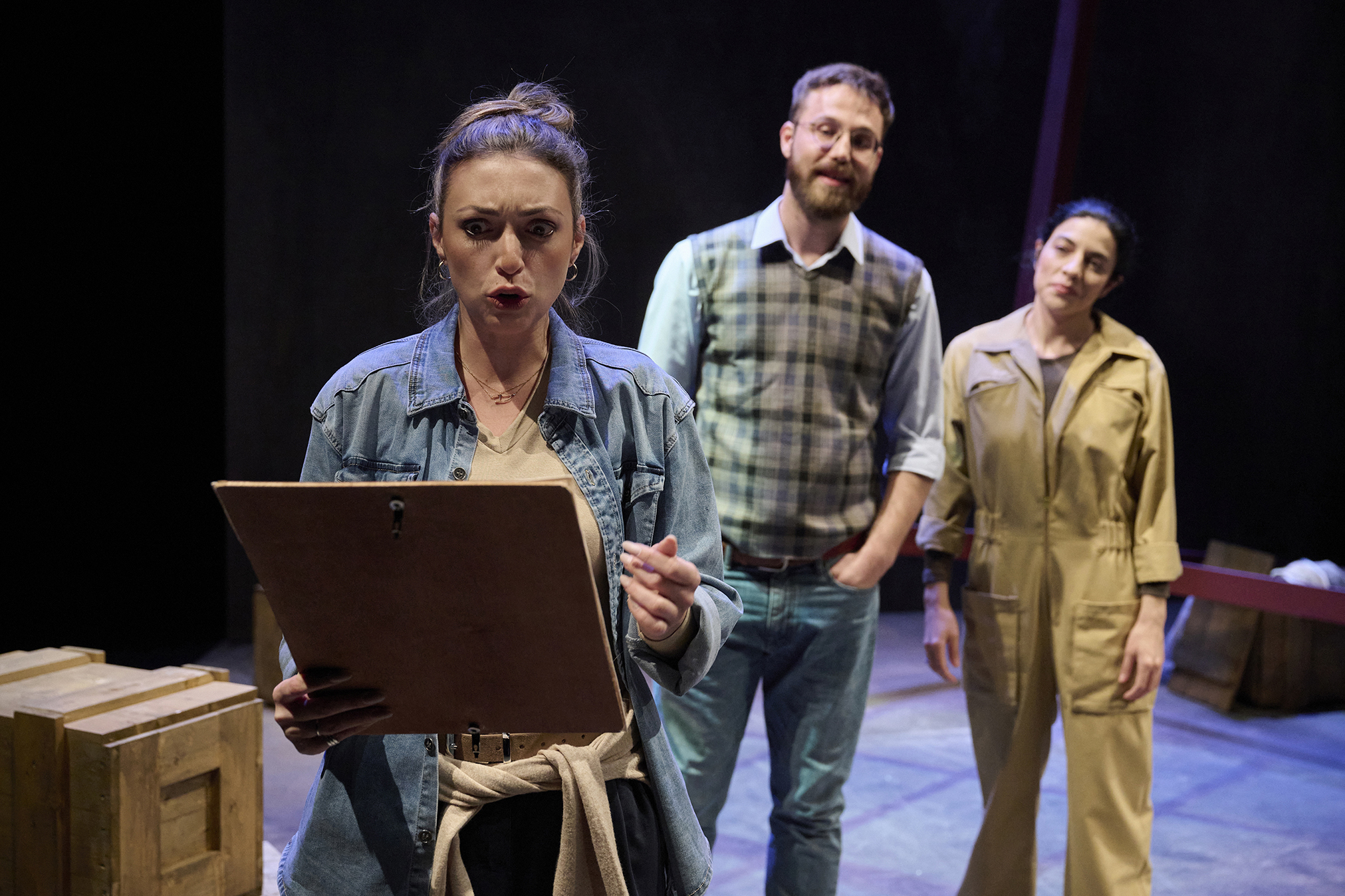Would a close-to-the-bone performance that will ‘shake you up a bit’ benefit from being enjoyed by a wider audience?
“I want to do a crossover with the English-speaking audience,” says Athena Xenidou, sounding almost impatient.
Xenidou is the director of Nachtland, a play by German writer Marius von Mayenburg that’s now being performed (in Greek) at the New Stage of the Cyprus Theatre Organisation (Thoc). The production premiered on November 1, and has proved to be a massive success. Every performance so far has been sold out, says Xenidou – yet she still pines a bit for the audience she might’ve had, wishing she could make them see that “there’s theatre that is close to them, that they can identify with”.
The Israeli community, in particular, would definitely want to see this play, I point out.
Sure, she agrees. But “I didn’t manage to reach them”.

Why the Israelis in particular? To answer that, let’s go back to the beginning – of the performance, that is. The audience file in (around 150 people, with a full house) and take their seats, then Elena Kallinikou – who plays Judith in the play – sidles up to each audience member, holding a small painting and asking them to “study it for a few moments”.
The audience at the Sunday performance I attended seemed a bit nonplussed, clearly suspecting nothing. “What is it?” asks one woman. “It’s a painting that was found in the attic,” replies Kallinikou vaguely.
Some audience members give it a cursory glance and pass it on. Others take the task seriously, trying to find clues in the nondescript image. A woman at a previous performance refused to touch the painting, and loudly declared she wanted nothing to do with it. How come? “She’d obviously read the plot in advance!” laugh the actors.
The painting shows a church, in shades of brown and sepia, with a small shadowy figure standing before it. The church is actually the Ruprechtskirche, St Ruprecht’s Church in Vienna – and the painting is actually a copy of a real painting, dating from 1912. No-one in the audience on Sunday thought to check the name of the artist, which is mostly obscured by the frame anyway. Had they done so, however, they’d have seen – as the characters in the play see – the inscription ‘A. Hitler’.
That, in a nutshell, is the premise, a German family discovering a (probably) authentic Hitler painting – from the days when he dabbled in art, as opposed to mass murder – and wondering what to do with it.
Kristi Papadopoulou and Christos Grozos play Nicola and Philipp, two siblings clearing out their father’s house after his death who find the valuable (but problematic) artwork in the attic. Kallinikou, as already mentioned, plays Judith, Philipp’s wife, who happens to be Jewish. Christina Pavlidou plays an expert who authenticates the painting – she also has a small role at the very end – while Alexandros Parissis appears in another double role (five actors play seven characters, as per the playwright’s instructions), as Nicola’s husband Fabian and a brash art collector who arrives, chequebook in hand, to buy the Hitler.
The actors seem an affable bunch, huddling together – along with Xenidou – for a brief interview just before the performance. Yet their job seems remarkably difficult, the play full of intricate, often cerebral speeches delivered at breakneck speed. It’s actually a bit unnerving watching the show right after the interview, plunged into an hour-plus of high-energy fury and sardonic, rapid-fire rants delivered by people I’d been happily chatting to just a few minutes earlier.
Nachtland has an interesting cast, especially for a Thoc production. Pavlidou, in addition to theatre work, spent many years as Nastazia on TV’s Vourate Geitonoi, as beloved a part of Cypriot culture as halloumi with watermelon; she’s undoubtedly the most familiar name to a mass audience. Parissis, too, is a very experienced actor and Thoc stalwart, having appeared in many productions during his 15 years in Cyprus. (Coincidentally, both male actors are from Greece, while the actresses are Cypriot.) He exudes the quiet confidence of a man in familiar surroundings, and also has the mainland Greek’s knack for a witty turn of phrase; I chuckle when he says – apropos of some idea that provokes much enthusiasm – that it sends your mind flying “like a Dobermann going after a kitten”.

Grozos, on the other hand, is a younger, 28-year-old actor who’s never worked in Cyprus before, having come to audition specifically for this play. He’s more diffident, and I mistakenly assume his part must be minor – but in fact Philipp is a pivotal role, the character who changes most during the course of the play. Judith, however, is the catalyst, “the obstacle to everyone” who refuses the ‘obvious’ course of selling the painting for a shedload of money, and instead wants to destroy it.
Is she right? On the one hand, one should always try to separate the art from the artist. On the other, profiting from the art of a homicidal madman seems obscene, a slap in the face to Holocaust victims.
Philipp whimsically claims that the painting is hopeful, standing for a kind of “utopian vision” where Hitler might’ve become a successful artist instead of a monster. Judith, unsurprisingly, sees it differently – and wonders why her father-in-law had a Nazi painting in his attic in the first place. Then again, as the others point out when she suggests burning the thing, “only Nazis burn art”.
Nachtland is a heady stew, conceived as satire but cutting close to the bone – which is also, I suspect, why Xenidou laments being limited to a Greek-speaking crowd (though there are performances with English surtitles, on which more later). This play is full of ideas, and none of them are uniquely Greek or Cypriot.
Oddly enough, Nicosia is only the fourth city where the play has been staged, after Berlin, London (at the Young Vic, directed by Patrick Marber) and Athens (where it premiered two weeks before Thoc). Von Mayenburg’s writing is nothing but dialogue, explains the director – not even stage directions or character descriptions – so she added some flourishes. Philipp and Judith dance to Leonard Cohen’s ‘Dance Me to the End of Love’. Film footage appears on a giant screen, a reminder of Xenidou’s past experience in film and TV as well as theatre.
Even more intriguingly, this may be the first production where the painting is actually seen. Previous directors (at least in Berlin and London) kept it veiled, like the glowing briefcase in Kiss Me Deadly, as if it were too toxic for the audience to view – and certainly no-one else had the idea of letting the audience touch it before the play starts. “I wanted it to be interactive,” explains Xenidou. “You suddenly bond [with the painting]. It becomes yours, even just a little bit.”
Kudos for adding nuance. Yet there’s also another aspect, an elephant in the room whose loud trumpeting is not very nuanced.
Nachtland is a play about systemic anti-Semitism in Germany; at one point, Judith launches into a long list of German cultural icons with a history of being Jew-haters. She also claims that criticising Israel is “the anti-Semitism of the Left”. It was, however, written in 2022 – that’s to say, before Gaza. Can there still be an appetite for such a play today, in Cyprus, given what’s happening just next door to us?
There’s no easy answer to that. Some will say that any attempt to paint Jews as victims now, at this historical moment, is simply tone-deaf – not to mention that a play, where the author inevitably stacks the deck to fit the drama, isn’t the best forum for political debate. At one point, for instance, Judith bristles at the notion that Jews should learn from their own experience vis-à-vis Palestine, accusing Philipp of trying to turn the Holocaust into a positive – an obvious strawman argument, but Von Mayenburg gives her the advantage.
It’s a play “that shakes you up a bit,” admits Xenidou when the question is put to her. The point is that “you come with a certain opinion, which may end up changing during the course of the play… Either way, it’ll definitely shake you up. And you might say, ‘OK, it’s not black and white’.”
“It’s the kind of play,” adds Parissis, “where it’s not like ‘Oh, let’s go to the theatre and forget about life for a while’. It’s exactly the opposite!”
It raises subjects, says his colleague Grozos, which are conversations we’re having anyway, in our daily lives. “We could sit and spend hours talking about this play.”
True enough – but who is ‘we’? One performance, on November 10, ended with an actual discussion with the audience, which went well (“They asked the right questions”) – but surely it might’ve been more productive to have a discussion with an international audience, maybe including some actual Germans (who could weigh in on the play’s assertion that “Hitler is in Germany’s DNA”) and Jews.
Steps are being taken to address the situation. A few performances do have English and Turkish surtitles; there’s at least one more coming up (more may be added), in Limassol on December 12.
It makes sense for our national theatre to be moving on from a narrow definition of ‘national’ – plus there’s also a simple commercial argument. We have tens of thousands of non-Greek-speakers now, many of whom would surely go to the theatre if they could. “You have to build a bridge with the English-speaking audience. And I’m sure they’re thirsty for entertainment.”
It’s an oddly appropriate argument to be having, for a play that’s so much about lineage. The painting’s own ‘roots’ (i.e. who painted it) are the crux of the drama, and the characters react according to their own roots. Theatre, however, shouldn’t really have roots, at least not in that limiting way – which is precisely why a play from Germany can stir and stimulate an audience of Cypriots. And others too, hopefully.







Click here to change your cookie preferences